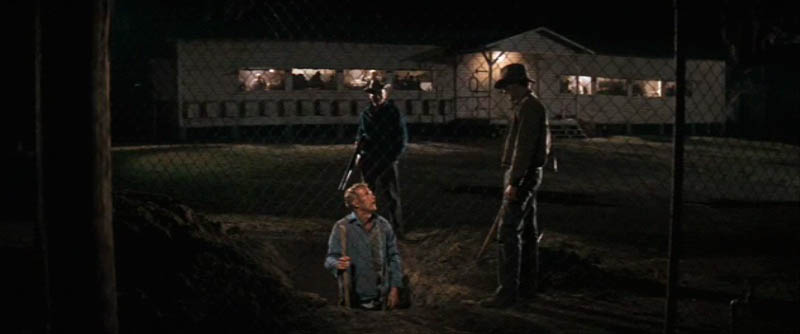Cool Hand Luke is one of the few successful movies in which the message was the primary purpose for its creation. Cool Hand Luke was not too subtle, not too vague. It got its message across without feeling like a philosophy lecture. The story was also full of well executed humor and interesting scenes that helped develop the themes. One technique I particular liked is one that makes me love westerns: no excessive dialogue. For a main character, Luke has very few lines so when he does speak it hold more meaning. Unlike in most recent movies the characters do things without attempting a joke or witty comment, the story holds the viewer’s attention all on its own. There are two main characteristics that best describe Luke. 1.) Luke is Determined. He wins the fight without landing a solid punch, just by standing in the ring and taking a beating till Dragline walked away tired and confused. He earned his nickname by bluffing his way to victory with a “cool hand” full of nothing. He’ll break before he’ll bend the whole movie they try to make him bend… until he broke. This is similar to a theme in One Flew Over the Cuckoo’s Nest where Chief talks about “the Combine” (the man) always working people who don’t conform, like his father, Mcmurphy and Himself. Both movies are talking about how society and its establishments are always trying to bend people into certain shapes that are “acceptable”. Both tell stories of men whose wills are made of stronger steel. 2.) Luke is selfless. I would argue more so than Mcmurphy. Luke played cards and we even see him win. However Mcmurphy was winning a lot of money playing cards and betting on essentially everything. Luke makes a game out of paving the road and we see the other inmates smiling and even laughing as the race to finish the road. The egg eating scene is another example of this. The other inmates get more excited about the event than Luke does. Like Mcmurphy Luke does many things that, aren’t really a big deal in and of themselves, but defy the man and thus give hope to their peers.
Cool Hand Luke is full of symbolism; some is hard to miss, some is very subtle. Vehicles symbolize freedom. The woman all the men stare at was washing her car. The car wasn’t very dirty but she continues washing it (and herself) after it’s clean to emphasize her freedom. The Trucks used to transport the inmates represent how they are allowed to see freedom and even get a small taste. When Luke steals all the keys then drives away it says a lot about his desire for freedom since surely the inmates who had been there for years had considered doing the same but decided it wasn’t worth the risks. The inmates, being inmates, do not drive however they are made to do physical work to improve the roads, those without freedom being made to work for the good of those with freedom. Road signs and parking meters represent restrictions of freedom. After his first escape Luke was caught when he stopped at a red light and a police officer stopped next to him noticed his inmate’s uniform. The movie opens with Luke removing the heads of objects designed to control where, when, and how long you park. There is also a lot of more spiritual symbolism. Death is a strong theme throughout the movie. His mother’s death contributed to his desire to escape. At the he end of the egg scene we see him lying in a Christ like pose on the table surrounded by egg shell that appear almost like flowers, the other men joked that eating 50 eggs would kill him but he did it anyway and almost proved them correct. The scene where the boss’s make him continuously dig then fill in a grave shaped hole, is a clear reference to how his actions and defiance led to his death. Throughout the movie the background music is gospel and the inmates are also shown playing gospel music in the prison. One of Christianity’s two fundamental values is forgiveness which runs contrary the basic ideas behind a prison.
Another strong theme is Luke’s faith. Luke definitely believes in God, but the relationship is like that of a son who believes his father never cared for him. The seen in the rain might make it seem like he doesn’t believe, as he mocks Dragline for fearing God. Luke believes in God but that doesn’t mean he likes and/or fears God or wants other people to. The final scene confirms his belief. Nobody on the run stops in a church then prays where no man will hear him if he doesn’t believe in the entity he is praying to. Luke prays as if in conversation with the Lord instead of in the more structured way many people do. He admits his sins, asks for help, then he asks a question that resonates with a theme found in almost every scene. Luke has no fear of death and moves toward desiring it near the end of the film. He asks God “When does it end”. Judas (Dragline) comes and try’s to bring him out of the church, and the analogy with Christ is complete. It’s worth thinking about that Luke has always wanted people to leave him be, he hates the unending regulations that govern his life, but he desires for God to get involved, to stop leaving him alone.
Cool hand Luke is a movie that may, to a casual observer seem like a simple movie about a prisoner in the 1960’s, but the movie has amazing depth. The movie combines high quality acting, themes, plot, and meaning with such grace that no scene sacrifices one for another.

